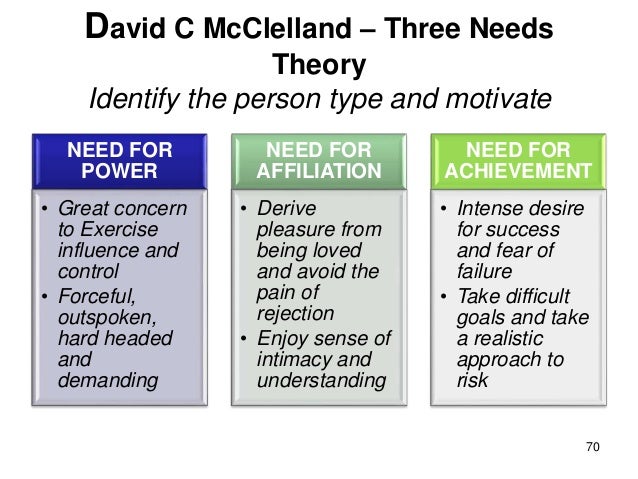Which of the Following Best Defines Mcclelland's Need for Achievement
This model was developed in the 1960s. It is the need to receive attention and recognition.
David Mcclelland Theory Of Motivation Needs Motivation Theory Maslow S Hierarchy Of Needs Learning And Development
Security affiliation and self-esteem e.

. McClellands Human Motivation Theory states that every person has one of three main driving motivators. The theory of need also known as the theory of the three needs proposed by the psychologist David McClelland is a motivational model that tries to explain how the needs for achievement power and affiliation affect the actions of people from a managerial context. We develop them through our culture and life experiences.
McClellands Needs Theory was proposed by a psychologist David McClelland who believed that the specific needs of the individual are acquired over a period of time and gets molded with ones experience of the life. It is the need to be able to control the behavior of others. The theory states that every person is driven by these three needs which.
This theory states that human behaviour is affected by three needs - Need for Power Achievement and Affiliation. Which of the following best defines McClellands need for achievement. According to McClelland needs are of three board categories.
None of the above 4. Need for achievement is the urge to excel to accomplish in relation to a set of standards to struggle to achieve success. McClellands Needs Theory is sometimes referred to as Three Need theory or Learned.
These motivators are not inherent. It is the need to accomplish something difficult on ones own. McClellands theory of motivation focuses on three needs that are learned from ones culture and family.
McClelland formulated needs related to motivation into three. In order to get this achievement you first need to complete the first lumberjack achievement of chopping down 100 treesWhen you have done that in order to get the master lumberjack achievement. According to McClellands research the need for achievement is A.
Question 1511 pts Which of the following best defines McClellands need for achievement. Which of the following best defines McClellands need for achievement. It states that every person irrespective of demographics age or race will have these needs although it.
What are the three categories of needs according to McClellands theory. The result of wanting to be liked by others. McClellands Theory of Needs Power Achievement and Affiliation McClellands theory of needs is one such theory that explains this process of motivation by breaking down what and how needs are and how they have to be approached.
Self-esteem self-actualization and power d. McClelland states that there are three types of needs. This theory states that human behaviour is affected by three needs - Need for Power Achievement and Affiliation.
It is the need to accomplish something difficult on ones own. It is the need to form close relationships with others. Affiliation achievement and power Easy.
It is the need to establish safe and stable places to live and work. Two decades earlier Maslows Hierarchy of Needs was. David McClelland and his associates proposed McClellands theory of Needs Achievement Motivation Theory.
Employees with a strong need for achievement are usually results-oriented. The need for achievement presents itself as an emotional drive towards progressing quickly delivering tasks succeeding attaining high levels of performance and other potentially competitive outcomes. It is the need to establish safe and stable places to live and work.
McClellands theory of needs is a theory that describes how people in an organization are motivated by the need for achievement affiliation and power. The first one is individualistic in nature while the other two are interpersonally oriented. Achievers like to solve problems and achieve goals.
David McClelland was an American Psychologist who developed his theory of needs or Achievement Theory of Motivation which revolves around. Affiliation challenge and achievement c. It is the need to be able to control the behavior of others.
Need for achievement is the urge to excel to accomplish in relation to a set of standards to struggle to achieve success. McClelland found that people with a high need for achievement perform better than those with a moderate or low need for achievement and noted regional national differences in achievement motivation. It is the need to form close relationships with others.
It is the need to form close relationships with others. The three motivating needs that McClelland cites are the need for achievement need for power and need for affiliation. Doc Mcclelland S Human Motivation Theory Rozana Reduan Academia Edu McClelland states that there are three types of needs.
In other words need for achievement is a Behaviour directed towards competition with a standard of excellence. The needs for achievement affiliation or power. Important to most American managers.
Need for achievement Need for power Need for affiliation. A desire to influence others. The first need detailed in McClellands Acquired Needs Motivation Theory is the need for achievement.
David McClelland and his associates proposed McClellands theory of Needs Achievement Motivation Theory. It is the need to accomplish something difficult on ones own Joshua is. Which of the Following Best Defines Mcclellands Need for Achievement - April 18 2022 It is the need to.
Achievement refers to desire to excel or achieve in relation to a set of standards. Achievement power and affiliation. According to McClelland the need for achievement supports the idea that humans want to have control over other people to complete this physiological need.
Viewed unfavorably by most entrepreneurs. Need for achievement need for affiliation and need for power.
Motivation Theories Early And Contemporary Modern Theories Of Motivation
David Mcclellands Three Needs Theory Gamewornauctions Net
Quiz Worksheet Mcclelland S Theory Of Motivation Study Com
Mcclelland S Acquired Needs Motivation Theory The World Of Work Project

0 Response to "Which of the Following Best Defines Mcclelland's Need for Achievement"
Post a Comment